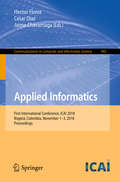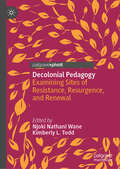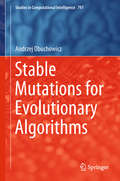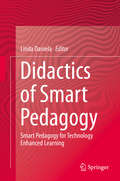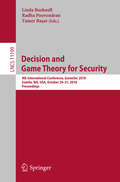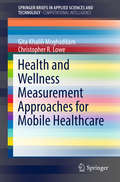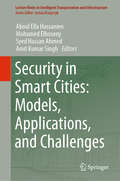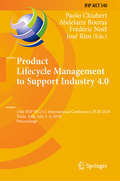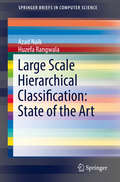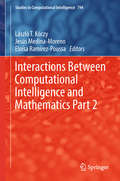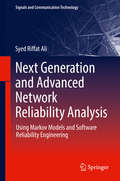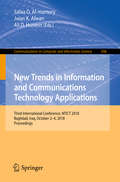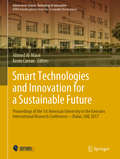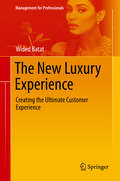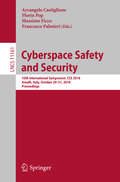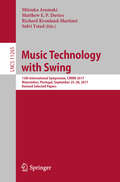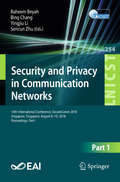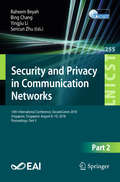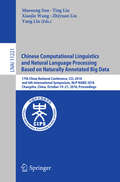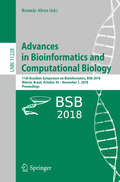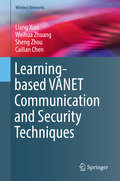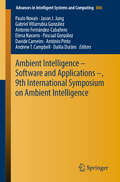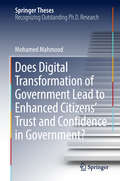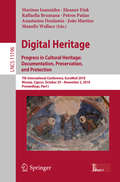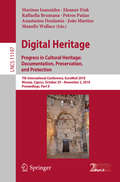- Table View
- List View
Applied Informatics: First International Conference, ICAI 2018, Bogotá, Colombia, November 1-3, 2018, Proceedings (Communications in Computer and Information Science #942)
by Hector Florez Cesar Diaz Jaime ChavarriagaThis book constitutes the thoroughly refereed papers of the First International Conference on Applied Informatics, ICAI 2018, held in Bogotá, Colombia, in November 2018. The 27 full papers were carefully reviewed and selected from 81 submissions. The papers are organized in topical sections on data analysis; decision systems; health care information systems; IT architectures; learning management systems; mobile information processing systems; robotic autonomy; software design engineering.
Decolonial Pedagogy: Examining Sites of Resistance, Resurgence, and Renewal
by Njoki Nathani Wane Kimberly L. ToddThrough innovative and critical research, this anthology inquires and challenges issues of race and positionality, empirical sciences, colonial education models, and indigenous knowledges. Chapter authors from diverse backgrounds present empirical explorations that examine how decolonial work and Indigenous knowledges disrupt, problematize, challenge, and transform ongoing colonial oppression and colonial paradigm. This book utilizes provocative and critical research that takes up issues of race, the shortfalls of empirical sciences, colonial education models, and the need for a resurgence in Indigenous knowledges to usher in a new public sphere. This book is a testament of hope that places decolonization at the heart of our human community.
Stable Mutations for Evolutionary Algorithms (Studies in Computational Intelligence #797)
by Andrzej ObuchowiczThis book presents a set of theoretical and experimental results that describe the features of the wide family of α-stable distributions (the normal distribution also belongs to this class) and their various applications in the mutation operator of evolutionary algorithms based on real-number representation of the individuals, and, above all, equip these algorithms with features that enrich their effectiveness in solving multi-modal, multi-dimensional global optimization problems. The overall conclusion of the research presented is that the appropriate choice of probabilistic model of the mutation operator for an optimization problem is crucial. Mutation is one of the most important operations in stochastic global optimization algorithms in the n-dimensional real space. It determines the method of search space exploration and exploitation. Most applications of these algorithms employ the normal mutation as a mutation operator. This choice is justified by the central limit theorem but is associated with a set of important limitations. Application of α-stable distributions allows more flexible evolutionary models to be obtained than those with the normal distribution. The book presents theoretical analysis and simulation experiments, which were selected and constructed to expose the most important features of the examined mutation techniques based on α-stable distributions. It allows readers to develop a deeper understanding of evolutionary processes with stable mutations and encourages them to apply these techniques to real-world engineering problems.
Didactics of Smart Pedagogy: Smart Pedagogy for Technology Enhanced Learning
by Linda DanielaThe focus on smart education has become a new trend in the global educational field. Some countries have already developed smart education systems and there is increasing pressure coming from business and tech communities to continue this development. Simultaneously, there are only fragmented studies on the didactic aspects of technology usage. Thus, pedagogy as a science must engage in a new research direction—smart pedagogy. This book seeks to engage in a new research direction, that of smart pedagogy. It launches discussions on how to use all sorts of smart education solutions in the context of existing learning theories and on how to apply innovative solutions in order to reduce the marginalization of groups in educational contexts. It also explores transformations of pedagogical science, the role of the educator, applicable teaching methods, learning outcomes, and research and assessment of acquired knowledge in an effort to make the smart education process meaningful to a wide audience of international educators, researchers, and administrators working within and tangential to TEL.
Decision and Game Theory for Security: 9th International Conference, GameSec 2018, Seattle, WA, USA, October 29–31, 2018, Proceedings (Lecture Notes in Computer Science #11199)
by Linda Bushnell Radha Poovendran Tamer BaşarThe 28 revised full papers presented together with 8 short papers were carefully reviewed and selected from 44 submissions.Among the topical areas covered were: use of game theory; control theory; and mechanism design for security and privacy; decision making for cybersecurity and security requirements engineering; security and privacy for the Internet-of-Things; cyber-physical systems; cloud computing; resilient control systems, and critical infrastructure; pricing; economic incentives; security investments, and cyber insurance for dependable and secure systems; risk assessment and security risk management; security and privacy of wireless and mobile communications, including user location privacy; sociotechnological and behavioral approaches to security; deceptive technologies in cybersecurity and privacy; empirical and experimental studies with game, control, or optimization theory-based analysis for security and privacy; and adversarial machine learning and crowdsourcing, and the role of artificial intelligence in system security.
Health and Wellness Measurement Approaches for Mobile Healthcare (SpringerBriefs in Applied Sciences and Technology)
by Gita Khalili Moghaddam Christopher R. LoweThis book reviews existing sensor technologies that are now being coupled with computational intelligence for the remote monitoring of physical activity and ex vivo biosignatures. In today’s frenetic world, consumers are becoming ever more demanding: they want to control every aspect of their lives and look for options specifically tailored to their individual needs. In many cases, suppliers are catering to these new demands; as a result, clothing, food, social media, fitness and banking services are all being democratised to the individual. Healthcare provision has finally caught up to this trend and is currently being rebooted to offer personalised solutions, while simultaneously creating a more effective, scalable and cost-effective system for all. The desire for personalisation, home monitoring and treatment, and provision of care in remote locations or in emerging and impoverished nations that lack a fixed infrastructure, is leading to the realisation that mobile technology might be the best candidate for achieving these goals. A combination of several technological, healthcare and financial factors are driving this trend to create a new healthcare model that stresses preventative ‘health-care’ rather than ‘sick-care’, and a shift from volume to value. Mobile healthcare (mhealth), which could also be termed the “internet of people”, refers to the integration of sensors and smartphones to gather and interpret clinical data from patients in real-time. Most importantly, with an ageing population suffering multiple morbidities, mhealth could provide healthcare solutions to enhance chronically ill patients’ quality of life.
Security in Smart Cities: Models, Applications, and Challenges (Lecture Notes in Intelligent Transportation and Infrastructure)
by Syed Hassan Ahmed Aboul Ella Hassanien Amit Kumar Singh Mohamed ElhosenyThis book offers an essential guide to IoT Security, Smart Cities, IoT Applications, etc. In addition, it presents a structured introduction to the subject of destination marketing and an exhaustive review on the challenges of information security in smart and intelligent applications, especially for IoT and big data contexts. Highlighting the latest research on security in smart cities, it addresses essential models, applications, and challenges.Written in plain and straightforward language, the book offers a self-contained resource for readers with no prior background in the field. Primarily intended for students in Information Security and IoT applications (including smart cities systems and data heterogeneity), it will also greatly benefit academic researchers, IT professionals, policymakers and legislators. It is well suited as a reference book for both undergraduate and graduate courses on information security approaches, the Internet of Things, and real-world intelligent applications.
Product Lifecycle Management to Support Industry 4.0: 15th Ifip Wg 5. 1 International Conference, Plm 2018, Turin, Italy, July 2-4, 2018, Proceedings (IFIP Advances in Information and Communication Technology #540)
by Paolo Chiabert Abdelaziz Bouras Frédéric Noël José RíosThis book constitutes the refereed post-conference proceedings of the 15th IFIP WG 5.1 International Conference on Product Lifecycle Management, PLM 2018, held in Turin, Spain, in July 2018.The 72 revised full papers presented were carefully reviewed and selected from 82 submissions. The papers are organized in the following topical sections: building information modeling; collaborative environments and new product development; PLM for digital factories and cyber physical systems; ontologies and data models; education in the field of industry 4.0; product-service systems and smart products; lean organization for industry 4.0; knowledge management and information sharing; PLM infrastructure and implementation; PLM maturity, implementation and adoption; 3D printing and additive manufacturing; and modular design and products and configuration and change management.
Large Scale Hierarchical Classification: State of the Art (SpringerBriefs in Computer Science)
by Azad Naik Huzefa RangwalaThis SpringerBrief covers the technical material related to large scale hierarchical classification (LSHC). HC is an important machine learning problem that has been researched and explored extensively in the past few years. In this book, the authors provide a comprehensive overview of various state-of-the-art existing methods and algorithms that were developed to solve the HC problem in large scale domains. Several challenges faced by LSHC is discussed in detail such as: 1. High imbalance between classes at different levels of the hierarchy 2. Incorporating relationships during model learning leads to optimization issues 3. Feature selection 4. Scalability due to large number of examples, features and classes 5. Hierarchical inconsistencies 6. Error propagation due to multiple decisions involved in making predictions for top-down methods The brief also demonstrates how multiple hierarchies can be leveraged for improving the HC performance using different Multi-Task Learning (MTL) frameworks. The purpose of this book is two-fold: 1. Help novice researchers/beginners to get up to speed by providing a comprehensive overview of several existing techniques. 2. Provide several research directions that have not yet been explored extensively to advance the research boundaries in HC. New approaches discussed in this book include detailed information corresponding to the hierarchical inconsistencies, multi-task learning and feature selection for HC. Its results are highly competitive with the state-of-the-art approaches in the literature.
Interactions Between Computational Intelligence and Mathematics Part 2
by László T. Kóczy Jesús Medina-Moreno Eloísa Ramírez-PoussaThis book presents recent research in the field of interaction between computational intelligence and mathematics. In the current technological age, we face the challenges of tackling very complex problems – in the usual sense, but also in the mathematical and theoretical computer science sense. However, even the most up-to-date results in mathematics, are unable to provide exact solutions of such problems, and no further technical advances will ever make it possible to find general and exact solutions. Constantly developing technologies (including social technologies) necessitate handling very complex problems. This has led to a search for acceptably “good” or precise solutions, which can be achieved by the combination of traditional mathematical techniques and computational intelligence tools, in order to solve the various problems emerging in many different areas to a satisfactory degree. Important funding programs, such as the European Commission’s current framework programme for research and innovation – Horizon 2020 – are devoted to the development of new instruments to deal with the current challenges. Without doubt, research topics associated with the interactions between computational intelligence and traditional mathematics play a key role. Presenting contributions from engineers, scientists and mathematicians, this book offers a series of novel solutions for meaningful and real-world problems that connect those research areas.
Next Generation and Advanced Network Reliability Analysis: Using Markov Models and Software Reliability Engineering (Signals and Communication Technology)
by Syed Riffat AliThis book covers reliability assessment and prediction of new technologies such as next generation networks that use cloud computing, Network Function Virtualization (NVF), Software Defined Network (SDN), Next Generation Transport, Evolving Wireless Systems, Digital VoIP Telephony, and Reliability Testing techniques specific to Next Generation Networks (NGN). This book introduces the technology to the reader first, followed by advanced reliability techniques applicable to both hardware and software reliability analysis. The book covers methodologies that can predict reliability using component failure rates to system level downtimes. The book’s goal is to familiarize the reader with analytical techniques, tools and methods necessary for analyzing very complex networks using very different technologies. The book lets readers quickly learn technologies behind currently evolving NGN and apply advanced Markov modeling and Software Reliability Engineering (SRE) techniques for assessing their operational reliability.Covers reliability analysis of advanced networks and provides basic mathematical tools and analysis techniques and methodology for reliability and quality assessment;Develops Markov and Software Engineering Models to predict reliability;Covers both hardware and software reliability for next generation technologies.
New Trends in Information and Communications Technology Applications: Third International Conference, NTICT 2018, Baghdad, Iraq, October 2–4, 2018, Proceedings (Communications in Computer and Information Science #938)
by Safaa O. Al-mamory Jwan K. Alwan Ali D. HusseinThis book constitutes the refereed proceedings of the Third International Conference on New Trends in Information and Communications Technology Applications, NTICT 2018, held in Baghdad, Iraq, in October 2018.The 18 papers presented were carefully reviewed and selected from 86 submissions. The papers are organized in topical sections, namely: Computer networks; system and network security; machine learning; intelligent control system; communication applications; computer vision; and e-learning.
Smart Technologies and Innovation for a Sustainable Future: Proceedings of the 1st American University in the Emirates International Research Conference — Dubai, UAE 2017 (Advances in Science, Technology & Innovation)
by Ahmed Al-Masri Kevin CurranThe book presents high-quality research papers presented at the 1st AUE International research conference, AUEIRC 2017, organized by the American University in the Emirates, held on November 15th-16th, 2017 in Dubai. The book is broadly divided into three sections: Media and Smart Cities, Creative Technologies and Innovation, and Security Risks and Strategic Challenges. The areas covered under these sections are cyber-psychology and digital forensics, cloud RAN architecture, networking functions virtualization, e-Governance and IoT semantic interoperability, ERP security, web-based application and problem-solving skills, smart technologies and advertising, smart technologies for smart cities, smart adaptable navigation systems, turbo codes for security key generation, technology advanced student learning and mobile devices, big data security and privacy, multi-channel buffer enabled technique, physiological signal acquisition in electro-oculography, blockchain and donation-based crowdfunding, smart city and framework development approach, news channel and media education, UAE foreign policy, China-GCC relations, diplomacy in the Internet age, intelligent cyber-security strategies, industry securities and strategic challenges, hybrid alliances and corporate security, security and privacy in smart cities, human computer interaction and e-learning solution, complexity of smart cities governance. The papers included in this book present insightful information on the most recent and relevant research, theories and practices in the field, which aim for a sustainable future.
The New Luxury Experience: Creating the Ultimate Customer Experience (Management for Professionals)
by Wided BatatThis professional book introduces marketing and luxury brand professionals to a new definition of luxury and the art of designing the ultimate luxury experience in both the physical space (e.g., in-store, hotel, restaurant) and the digital space (e.g., social media, website, e-commerce). Specifically, it offers an overview of customer experience issues and explores big five experiential strategies that can be applied by luxury houses in order to provide the best luxury experience to their customers. Themes such as quality of customer luxury experience, immersion and co-production/co-creation in luxury, creation and management, digital and immersive marketing, and innovative market research are also examined. How do consumers define luxury? Is there one luxury or several “luxuries”? What kind of luxury experiences consumers want to live? How can luxury houses design the ultimate luxury experience? More than in any other sector, luxury consumption is a response to a search for emotions, pleasure, uniqueness, consideration and greatest services. The luxury consumer wants to live luxury experiences – not just buy luxury products or services. In this way, this book presents the luxury consumption experience as a combination of symbolic meaning, subconscious processes and nonverbal cues and characterized by fantasies, feelings and fun. Featuring case studies and interviews from international luxury sectors and brand managers such as Burberry, Dior, Porsche, Breitling, St. Regis Hotels & Resorts, and Louis Vuitton, among others, this book offers both a research and management perspective on luxury experience to professionals in the luxury sector (e.g., CEOs, brand managers, marketing and communication professionals), as well as marketing professors, students, and people eager to learn more about how to design the ultimate luxury experience. Praise for The New Luxury Experience “This book provides a holistic perspective on marketing of luxury brands, offering both useful practical advice as well as illustrating important cases.” -- Ravi Dhar, Director, Yale Center for Customer Insights, Yale University “Wided Batat’s book offers a fresh, insightful and comprehensive analysis of the concept of the consumer’s experience with luxury whatever that may be. The Five experiential luxury strategies proposed by Wided highlight that luxury management should go above and beyond the design and branding of luxury goods and services. I also commend the consideration given to the younger generations’ approach to luxury and to corporate social responsibility aspects. Luxury marketers should find this book very useful indeed.” -- Francesca Dall’Olmo Riley, Professor of Brand Management, Kingston Business School, UK
Cyberspace Safety and Security: 10th International Symposium, CSS 2018, Amalfi, Italy, October 29–31, 2018, Proceedings (Lecture Notes in Computer Science #11161)
by Arcangelo Castiglione Florin Pop Massimo Ficco Francesco PalmieriThis book constitutes the proceedings of the 10th International Symposium on Cyberspace Safety and Security, CSS 2018, held in Amalfi, Italy, in October 2018. The 25 full papers presented in this volume were carefully reviewed and selected from 79 submissions.The papers focus on cybersecurity; cryptography, data security, and biometric techniques; and social security, ontologies, and smart applications.
Music Technology with Swing: 13th International Symposium, CMMR 2017, Matosinhos, Portugal, September 25-28, 2017, Revised Selected Papers (Lecture Notes in Computer Science #11265)
by Mitsuko Aramaki Matthew E. Davies Richard Kronland-Martinet Sølvi YstadThis book constitutes the refereed proceedings of the 13th International Symposium on Music Technology with Swing, CMMR 2017, held in Matosinhos, Portugal, in September 2017. The 44 full papers presented were selected from 64 submissions. The papers are grouped in eight sections: music information retrieval, automatic recognition, estimation and classification, electronic dance music and rhythm, computational musicology, sound in practice: auditory guidance and feedback in the context of motor learning and motor adaptation, human perception in multimodal context, cooperative music networks and musical HCIs, virtual and augmented reality, research and creation: spaces and modalities.
Security and Privacy in Communication Networks: 14th International Conference, Securecomm 2018, Singapore, Singapore, August 8-10, 2018, Proceedings, Part I (Lecture Notes of the Institute for Computer Sciences, Social Informatics and Telecommunications Engineering #254)
by Raheem Beyah Bing Chang Yingjiu Li Sencun Zhu"This two-volume set LNICST 254-255 constitutes the post-conference proceedings of the 14thInternational Conference on Security and Privacy in Communication Networks, SecureComm 2018, held in Singapore in August 2018. <P><P> The 33 full and 18 short papers were carefully reviewed and selected from 108 submissions. The papers are organized in topical sections on IoT security, user and data privacy, mobile security, wireless security, software security, cloud security, social network and enterprise security, network security, applied cryptography, and web security."
Security and Privacy in Communication Networks: 14th International Conference, Securecomm 2018, Singapore, Singapore, August 8-10, 2018, Proceedings, Part I (Lecture Notes of the Institute for Computer Sciences, Social Informatics and Telecommunications Engineering #254)
by Raheem Beyah Bing Chang Yingjiu Li Sencun Zhu"This two-volume set LNICST 254-255 constitutes the post-conference proceedings of the 14thInternational Conference on Security and Privacy in Communication Networks, SecureComm 2018, held in Singapore in August 2018. <P><P> The 33 full and 18 short papers were carefully reviewed and selected from 108 submissions. The papers are organized in topical sections on IoT security, user and data privacy, mobile security, wireless security, software security, cloud security, social network and enterprise security, network security, applied cryptography, and web security."
Chinese Computational Linguistics and Natural Language Processing Based on Naturally Annotated Big Data: 17th China National Conference, CCL 2018, and 6th International Symposium, NLP-NABD 2018, Changsha, China, October 19–21, 2018, Proceedings (Lecture Notes in Computer Science #11221)
by Maosong Sun Ting Liu Xiaojie Wang Zhiyuan Liu Yang LiuThis book constitutes the proceedings of the 17th China National Conference on Computational Linguistics, CCL 2018, and the 6th International Symposium on Natural Language Processing Based on Naturally Annotated Big Data, NLP-NABD 2018, held in Changsha, China, in October 2018. The 33 full papers presented in this volume were carefully reviewed and selected from 84 submissions. They are organized in topical sections named: Semantics; machine translation; knowledge graph and information extraction; linguistic resource annotation and evaluation; information retrieval and question answering; text classification and summarization; social computing and sentiment analysis; and NLP applications.
Advances in Bioinformatics and Computational Biology: 11th Brazilian Symposium on Bioinformatics, BSB 2018, Niterói, Brazil, October 30 – November 1, 2018, Proceedings (Lecture Notes in Computer Science #11228)
by Ronnie AlvesThis book constitutes the refereed proceedings of the 11th Brazilian Symposium on Bioinformatics, BSB 2018, held in Rio de Janeiro, Brazil, in October/November 2018. The 13 revised full papers presented were carefully reviewed and selected from 26 submissions. The papers cover all aspects of bioinformatics and computational biology.
Learning-based VANET Communication and Security Techniques (Wireless Networks)
by Liang Xiao Weihua Zhuang Sheng Zhou Cailian ChenThis timely book provides broad coverage of vehicular ad-hoc network (VANET) issues, such as security, and network selection. Machine learning based methods are applied to solve these issues. This book also includes four rigorously refereed chapters from prominent international researchers working in this subject area. The material serves as a useful reference for researchers, graduate students, and practitioners seeking solutions to VANET communication and security related issues. This book will also help readers understand how to use machine learning to address the security and communication challenges in VANETs. Vehicular ad-hoc networks (VANETs) support vehicle-to-vehicle communications and vehicle-to-infrastructure communications to improve the transmission security, help build unmanned-driving, and support booming applications of onboard units (OBUs). The high mobility of OBUs and the large-scale dynamic network with fixed roadside units (RSUs) make the VANET vulnerable to jamming. The anti-jamming communication of VANETs can be significantly improved by using unmanned aerial vehicles (UAVs) to relay the OBU message. UAVs help relay the OBU message to improve the signal-to-interference-plus-noise-ratio of the OBU signals, and thus reduce the bit-error-rate of the OBU message, especially if the serving RSUs are blocked by jammers and/or interference, which is also demonstrated in this book.This book serves as a useful reference for researchers, graduate students, and practitioners seeking solutions to VANET communication and security related issues.
Ambient Intelligence – Software and Applications –, 9th International Symposium on Ambient Intelligence (Advances In Intelligent Systems and Computing #806)
by Paulo Novais Jason J. Jung Gabriel Villarrubia González Antonio Fernández-Caballero Elena Navarro Pascual González Davide Carneiro António Pinto Andrew T. Campbell Dalila DurãesThe aim of the book is to introduce new developments in Ambient Intelligence from researchers of several countries. The book includes different works in the area of Ubiquitous Computing, e-Health, Ambient Assisted Living, Distributed Computing and Context Aware Computing that have been selected by an international committee. The studies have been presented in the 9th International Symposium on Ambient Intelligence held in Toledo in June 2018.
Does Digital Transformation of Government Lead to Enhanced Citizens’ Trust and Confidence in Government? (Springer Theses)
by Mohamed MahmoodThis research contributes to the growing body of knowledge as well as offers significant theoretical contributions and policy implications. As far as the researcher’s knowledge, this is the first research of its type that investigates the relationship between digital enabled transformation of government and citizens’ trust & confidence in government. The proposed conceptual model also makes a novel contribution at a conceptual level, which can be used as a frame of reference by researchers as well as practitioners when planning ICT-enabled transformation projects in government. The context of the research is the Kingdom of Bahrain, the top-ranked country in ICT adoption in the Gulf Cooperation Council (GCC) region.
Digital Heritage. Progress in Cultural Heritage: 6th International Conference, Euromed 2016, Nicosia, Cyprus, October 31 - November 5, 2016, Proceedings, Part I (Lecture Notes in Computer Science #10058)
by Manolis Wallace João Martins Anastasios Doulamis Petros Patias Raffaella Brumana Eleanor Fink Marinos IoannidesThis two-volume set LNCS 11196 and LNCS 11197 constitutes the refereed proceedings of the 7th International Conference on Digital Heritage, EuroMed 2018, held in Nicosia, Cyprus, in October/November 2018. The 21 full papers, 47 project papers, and 29 short papers presented were carefully reviewed and selected from 537 submissions. The papers are organized in topical sections on 3D Digitalization, Reconstruction, Modeling, and HBIM; Innovative Technologies in Digital Cultural Heritage; Digital Cultural Heritage –Smart Technologies; The New Era of Museums and Exhibitions; Digital Cultural Heritage Infrastructure; Non Destructive Techniques in Cultural Heritage Conservation; E-Humanities; Reconstructing the Past; Visualization, VR and AR Methods and Applications; Digital Applications for Materials Preservation in Cultural Heritage; and Digital Cultural Heritage Learning and Experiences.
Digital Heritage. Progress in Cultural Heritage: 6th International Conference, Euromed 2016, Nicosia, Cyprus, October 31 - November 5, 2016, Proceedings, Part I (Lecture Notes in Computer Science #10058)
by Manolis Wallace João Martins Anastasios Doulamis Petros Patias Raffaella Brumana Eleanor Fink Marinos IoannidesThis two-volume set LNCS 11196 and LNCS 11197 constitutes the refereed proceedings of the 7th International Conference on Digital Heritage, EuroMed 2018, held in Nicosia, Cyprus, in October/November 2018. The 21 full papers, 47 project papers, and 29 short papers presented were carefully reviewed and selected from 537 submissions. The papers are organized in topical sections on 3D Digitalization, Reconstruction, Modeling, and HBIM; Innovative Technologies in Digital Cultural Heritage; Digital Cultural Heritage –Smart Technologies; The New Era of Museums and Exhibitions; Digital Cultural Heritage Infrastructure; Non Destructive Techniques in Cultural Heritage Conservation; E-Humanities; Reconstructing the Past; Visualization, VR and AR Methods and Applications; Digital Applications for Materials Preservation in Cultural Heritage; and Digital Cultural Heritage Learning and Experiences.
